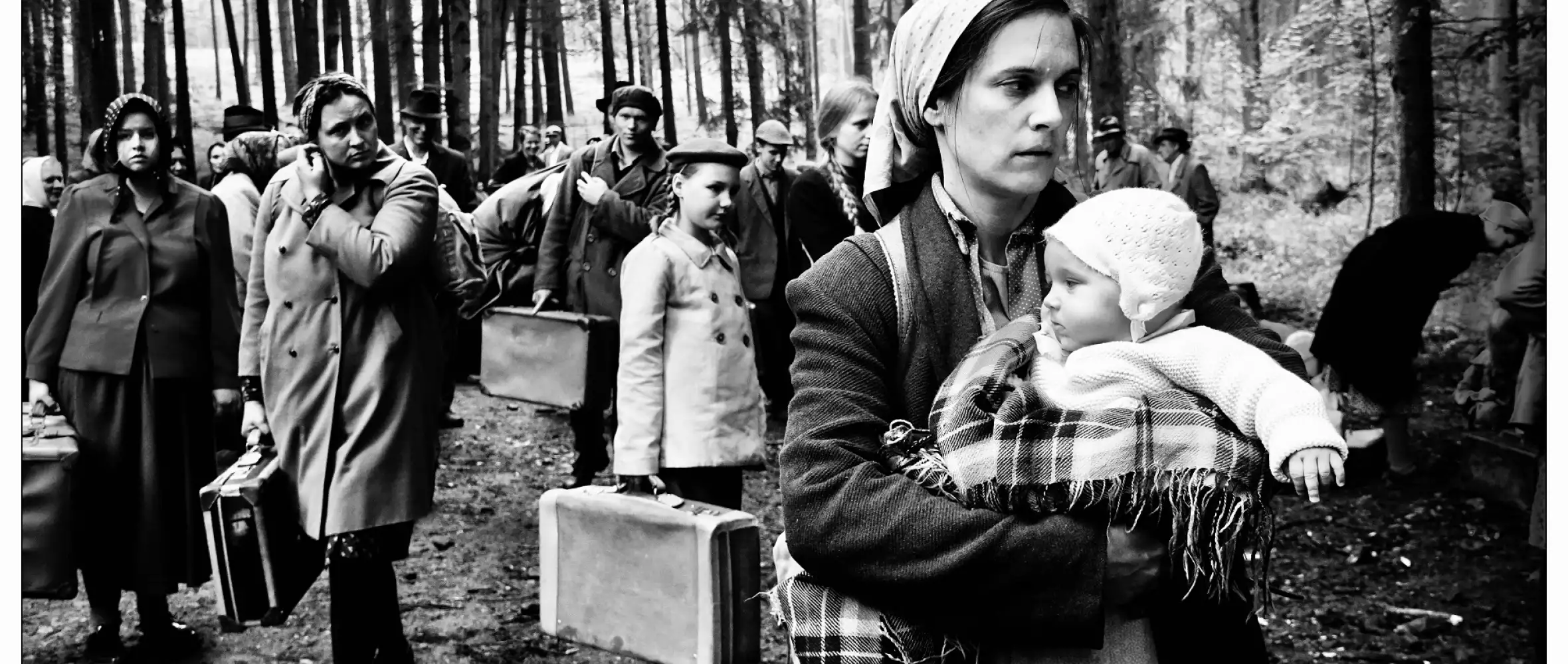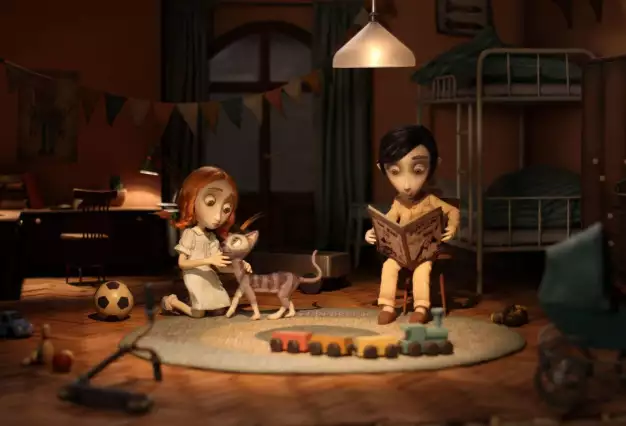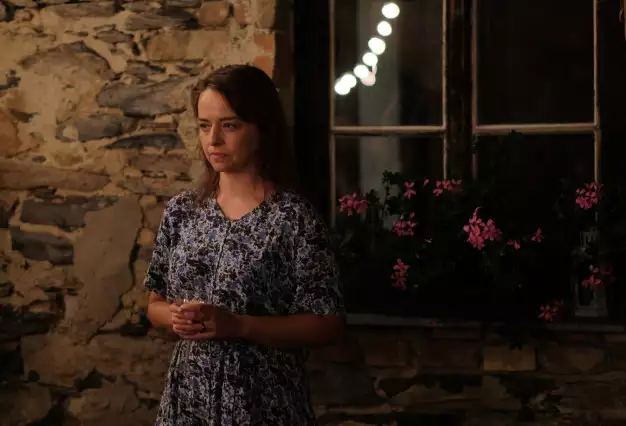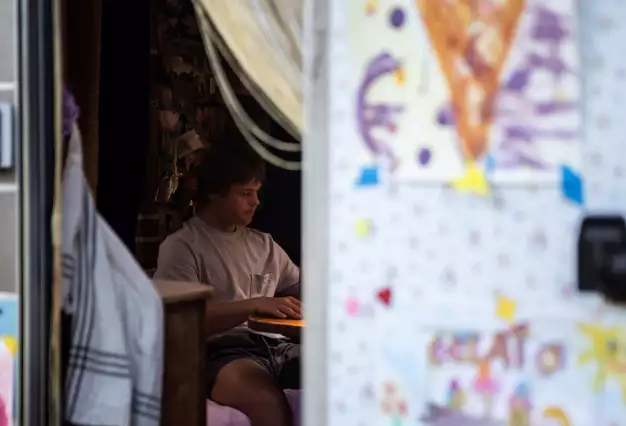
09 October 2019
Bohdan Sláma shoots war and vengeance in a frontier hamlet
Bohdan Sláma shoots war and vengeance in a frontier hamlet

The new film by leading Czech director Bohdan Sláma, Shadow Country, tells the tale of villagers on the Czech-German border living under the pressure of the epochal and cruel events of the 20th century.
Article by Pavel Sladký for CZECH FILM magazine / Fall 2019
The recently completed Shadow Country, with an original screenplay by Ivan Arsenjev, is set in Vitorazsko, part of South Bohemia's Sudeten region bordering on Austria. The film’s plot is set between the 1930s and the 1950s, from the rise of Nazism and Hitler’s occupation of Czechoslovakia, and the postwar displacement of the German-speaking population of the restored republic amid the beginnings of communist totalitarianism.
Director Bohdan Sláma is internationally known and widely acclaimed for contemporary dramas such as Wild Bees (main prize at the Rotterdam IFF), Something Like Happiness (Golden Shell at the San Sebastian IFF), Country Teacher (Venice Days), and Ice Mother (screenwriting award at the Tribeca Film Festival).
Shadow Country will be his first historical film, and presents a topic he says held him spellbound. “I was, of course, aware of what happened among the German, Czech, and Jewish populations after the rise of Nazism and, later, communism. But I was really shaken to the core by this story of a particular community whose once trifling neighborly conflicts gradually escalated into a vast injustice, vengeance, and indeed genocide. In Shadow Country we recount a story of the loss of sanity and the rise of ideology at the expense of rationality,” says the director.
"It will be a powerful film. We can promise you that."
The director says it’s the female characters in Shadow Country who manage to keep their sanity. “The women are the main victims of the wartime madness, but in spite – or perhaps because – of it they embody morality and humanity. Shadow Country is thus a celebration of female sensibility and solidarity.” And Sláma says the film’s third powerful motif, alongside the fate of women and the loss of reason and morality, is “the rise of the rabble” that inevitably accompanies historical upheaval and the thirst for revenge.
“The post-war retribution against the Germans and the rise of a régime that immediately put people with a yearning for revenge and property front and center – that stood out for me as another key motif in the course of making the film. Shadow Country thus examines the behavior of ordinary people in difficult times of historical upheaval when immediate interests, personal peril, or opportunities for advancement can easily override many people’s long-term value systems. Human integrity is based on an understanding of timeless moral values and is not about intelligence, but wisdom,” says the director of his approach to storytelling.
“The period from the end of the war in 1945 to the 1950s has rarely been dealt with in Czech film,” adds Shadow Country producer Jindřich Motýl, of the company Luminarfilm. “There have been few films, even documentaries, about the period. But it was a very dramatic time because of the brutal expulsion of the Germans from our country. Even today, we have not yet come to terms with it in the Czech Republic. The film, however, does not focus on an interpretation of history and certainly doesn’t go into politics. These are ordinary people who want to survive. And the film is about what happens when their lives are overtaken by major historical events,” says Motýl.
“Ivan Arsenjev’s screenplay is very strong on authenticity and the depth of narration about the ordinary people of the village of Schwarzwald. The story shows how evil does its work among people and what happens when it’s not nipped in the bud. And what humility, and hope, consists in. Shadow Country will be a very powerful experience. We can promise you that,” adds the producer.
The black widow and the man dehumanized by revenge
The main character in Shadow Country is Marie (played by Magdaléna Borová), a Czech woman who married a German before the war, so she too faces the threat of post-war vengeance. She returns to the village a “black widow”, as the director puts it, reminding Czechs of their own sins, and ends up being driven away a second time. Playing opposite her is Josef Pachl (portrayed by a Slovak actor of Hungarian origin, Csongor Kassai), a Czech who saw his Jewish wife hauled off to a concentration camp and was himself arrested by the Germans during the war. After the war, his behavior is motivated by a desire for revenge.
The main characters are surrounded by the villagers, who have different ways of coping with the historic and ethnic dilemmas. “The film is the portrait of a community. And the visual concept is in line with that. Individual scenes are shot in a single take with the emphasis on getting the maximum cinematic effect and breadth of field that enables the entire community to stand out,” says Sláma.
The film includes many complex long shots and was filmed on celluloid and in black and white. In Sláma’s words, the black-and-white stylization reflects the essence of the situation: it is an apt medium formally speaking, and can at the same time take in a lot of references. “The black-and-white image gets to the essence of the scene, it lets the facial expressions stand out, and the range between black and white also involve us in what the film is articulating – the many shades of grey in between black and white, all that lies between unequivocal good and evil.” This was Sláma’s first film in many years to be shot on celluloid, since his studies at FAMU, where he now heads the department of feature film directing, and he calls the experience a beautiful adventure.
Producer Motýl believes that while the black-and-white stylization may put off some viewers, it adds to the intensity of the experience. “We filmed on celluloid on a non-audio camera. That allows for top-quality black-and-white results that cannot be achieved with digital technology. Filming in black-and-white was Bohdan Sláma’s idea and now we know that it was certainly the right decision. Just a few minutes into the film you find yourself right in the middle of the period. And that’s what it’s all about!”
Shooting on Shadow Country began in February of 2019 in the part of north Bohemia called the Bohemian Paradise and then moved to the east Bohemian village of Bořice. “We spent a long time looking for the right location and, ironically, ended up finding it where the director himself lives,” say the producers. “It was a coincidence,” adds Bohdan Sláma, pointing out that he was not involved in the project when the village where he lives was chosen. “Above all I wanted to make sure the shoot wouldn’t disrupt relations among neighbors, and at the same time, we involved a lot of the locals in minor roles,” he says of filming on his home turf.
A universal portrait of community
“Right from the outset, I had more in mind for Shadow Country than just Czech audiences,” says Bohdan Sláma. “It would have been an indication that it’s not a good topic for a film if it only had a local impact. A story has to be meaningful to viewers anywhere in the world. Shadow Country is the story of a small community succumbing to enormous changes – a universal story about human beings, not only a medium for us Czechs to come to terms with our own history or heal our traumas.”
Producer Jindřich Motýl of Luminarfilm agrees. “In terms of the events we see in the film, we may be speaking to the domestic (Czech and Slovak) audiences, and our close neighbors, Germany and Austria. But the story is universal, and we are sure that it’s a film that will mean something to everyone on this planet,” he adds.
The film’s budget is EUR 1.5 million and it was funded by Czech Television as a co-producer, the Czech Film Fund, the Slovak co-producer Filmpark, and the Slovak Audiovisual Fund. Shadow Country is expected to be completed by autumn 2019, and audiences will first see it in 2020.




